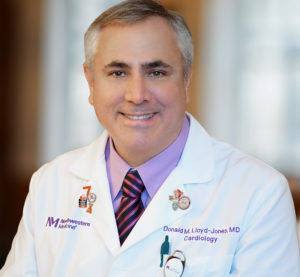
The Coronary Artery Risk Development in Young Adults (CARDIA) study, the largest ongoing longitudinal study of cardiovascular disease and risk from youth through later adulthood, has received a 10-year $11 million grant renewal from the National Heart, Lung, and Blood Institute at the National Institutes of Health.
“This renewal ensures that the CARDIA study can continue to contribute to our understanding of human cardiovascular disease across the life course. With an additional 10 years of funding through this contract from the National Heart, Lung, and Blood Institute, we will be able to continue to follow this dedicated group of volunteer participants, some of whom were enrolled at age 18, into their 60s and beyond,” said Donald Lloyd-Jones, MD, ScM, the chair and Eileen M. Foell Professor of Preventive Medicine and principal investigator of CARDIA’s Chicago field center.
CARDIA was launched in 1985 at four U.S. medical centers: Northwestern, the University of Alabama at Birmingham, the University of Minnesota and Kaiser Permanente in Oakland, Calif. Since the study’s inception, more than 5,000 CARDIA participants have undergone extensive psychological and physical examinations every two to five years, yielding crucial data which have led to new discoveries about the determinants, mechanisms and outcomes of cardiovascular disease and manifestations of aging.
“The careful study of their cardiovascular systems, brain and other critical processes from the molecular level to the occurrence of disease is providing crucial insights into the process of aging broadly,” said Lloyd-Jones, who is also a professor of Medicine in the Division of Cardiology and of Pediatrics.
Ten years ago, Lloyd-Jones inherited the position of principal investigator from Kiang Liu, PhD, professor emeritus of Preventive Medicine in the Division of Epidemiology. In 2021, CARDIA celebrated its 35th anniversary.
“We can now link early adult environmental exposures, adverse experiences and health behaviors all the way through to older age outcomes within the same individuals. This makes CARDIA a unique and contemporary resource and one of the premier studies on aging in the world,” Lloyd-Jones said.
According to Lloyd-Jones, this next decade of funding will allow CARDIA investigators to understand the next phase of the life course as participants have transitioned from healthy young adults to less healthy middle-aged adults, who are now transitioning into retirement and experiencing chronic diseases of aging. Lloyd-Jones said that investigators will also focus on studying cognitive function, measures of functional capacity and frailty, and trying to identify when in the life course there are critical periods to intervene to preserve heart and brain health.
See below for recent CARDIA coverage:






